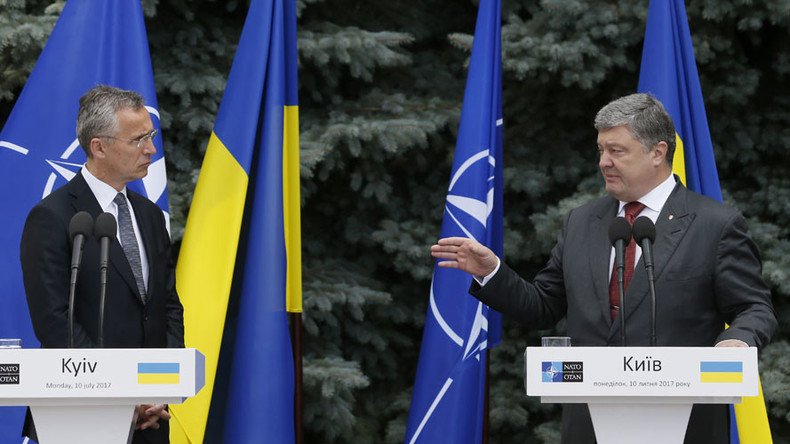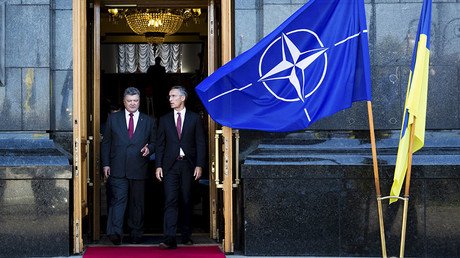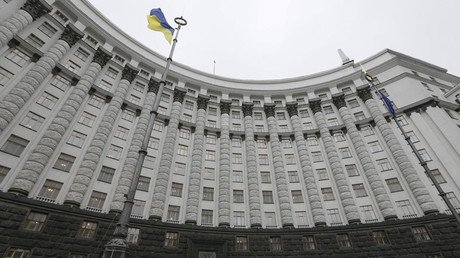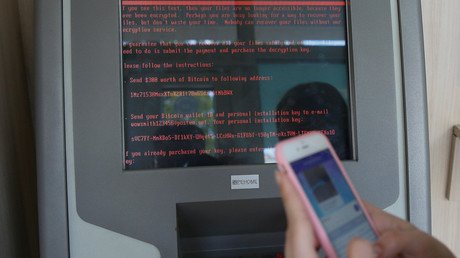Ukraine to meet NATO membership standards by 2020 – Poroshenko

Ukraine won’t apply to join NATO just yet, its president says, but will do everything necessary to meet the alliance’s standards by 2020. While Kiev thinks membership will improve its security, Russia worries it would just bring more NATO encroachment.
“We are determined to conduct reforms, have a clear schedule of what must be done by 2020 to meet the NATO membership criteria. Today, Ukraine does not meet these criteria, as nothing has been made over the past 20 years,” Ukraine President Petro Poroshenko said on Monday, as cited by the Defense Ministry’s website.
“Over the past three years we have made huge steps in the reforms and we are confident that this discussion will bring us closer to the given application. We have a plan for these three years, the program until 2020. We clearly know what to do. This is the first ‘roadmap’ in Ukraine,” he added.
Later in the day, Poroshenko said “it is now our priority to integrate into the Euro-Atlantic security environment to become a NATO member,”according to RIA Novosti Ukraine.
However, the Ukrainian president stressed that “it doesn’t mean we will apply right now,” noting his country, which is currently in a military stalemate with rebel regions in the east, “needs to draft a real reform program and speed up our efforts to reach [NATO] standards.”
On Sunday, Ukraine officially declared NATO membership a key foreign policy goal, effectively overturning the non-alignment policy of the previous government, which was violently ousted by the Western-backed Euromaidan coup of 2014.
The controversial new provision, which amends Ukraine’s main law related to security, stipulates that entry into “the Euro-Atlantic security realm… with the goal of becoming member of the North Atlantic Treaty Organization” is now a top policy priority.
The amendment was backed by 276 of the 450 lawmakers in the Verkhovna Rada on June 8. The authors of the draft asserted that NATO membership will help Ukraine “strengthen national security, sovereignty and territorial integrity” and “stop Russian aggression,” as quoted by Ukrinform news agency.
Meanwhile, NATO has clearly stated it will only accept European countries that prefer to solve domestic crises politically rather than by using coercive force.
According to the alliance’s 1995 Study on NATO Enlargement, prospective members, must commit themselves to settling “ethnic disputes or external territorial disputes, including irredentist claims, or internal jurisdictional disputes... by peaceful means.”
Consequently, methods for dealing with disputes “would be a factor in determining whether to invite a state to join the Alliance.”
In 2014, Kiev launched a massive offensive in eastern Ukraine against rebel forces who rejected the coup-installed authorities in the capital. The fierce hostilities have claimed the lives of at least 10,000 people, including civilians. Ukraine and its Western backers have accused Russia of supporting the rebels and violating Ukrainian sovereignty, though Moscow has repeatedly dismissed these allegations, for which no concrete evidence has been provided.
To date, the alliance has stopped short of rendering substantial support to Ukraine and its military. Speaking after a meeting with Poroshenko on Monday, NATO Secretary General Jens Stoltenberg, said the bloc had allocated €40 million to support Ukraine’s “command and control, cyber defense, and medical rehabilitation,” according to Interfax Ukraine.
The NATO Secretary General also said during the joint press conference with Poroshenko that the alliance was in the process of supplying cybersecurity equipment to “some key government institutions.” He then added that the new gear would "help Ukraine investigate who is behind the various attacks,” AP reported.
During the same press conference, the Ukrainian leader claimed that Kiev already had “evidence that the latest cyberattack [on Ukrainian institutions] was organized by Russia.”
The ransomware attack in late June that Poroshenko was referring to hit Ukrainian government, banks’ and energy companies’ websites, as well as key Russian and corporate systems in Europe and the US. Cybersecurity companies said the same cryptovirus, known as Petya, was used in the attacks. However, Ukrainian officials immediately started blaming Russia.
Moscow has been consistently opposed to Ukraine’s NATO accession bid, arguing it will not help European security.
“For many years, Russia has been concerned about moving NATO’s military infrastructure towards our borders,” Kremlin spokesman Dmitry Peskov told reporters, insisting that accepting Ukraine “will certainly not boost stability and security on the European continent.”















